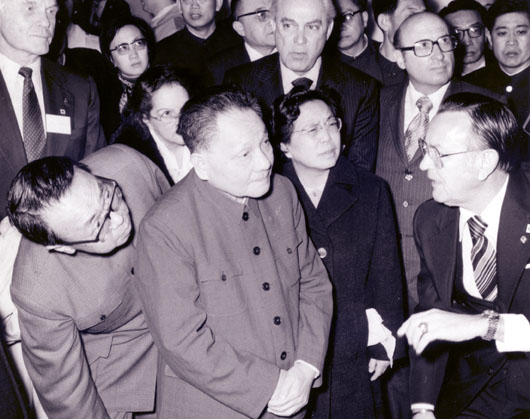Special to WorldTribune.com
UNITED NATIONS — Beijing held a big party to celebrate the Economic Reform process starting forty years ago which changed China and the world.
Amid the meticulous staging in the cavernous Great Hall of the People, China’s supreme leader Xi Jinping addressed the party faithful to a backdrop of massive red banners, gold trappings, and using the high octane nationalism which characterizes China’s long march from Mao to Markets.
Late 1978 was a tumultuous period in Mainland China. The long ruling dictator Mao had died two years earlier. The chaos of the so-called “Cultural Revolution” 1966-1976 still haunted society. China’s moribund Marxist economy could not keep pace with a rising population, nor seriously establish any standing in the world economy.

This would soon change faster than anyone could imagine. To paraphrase Napoleon, when China awakes “she will shake the world.”
The rather clumsy and cumbersome title, “The Third Plenum of the 11th Party Congress” in December 1978, launched “reform and opening” of China’s once static socialist economy.
Deng Xiaoping’s reform movement was based on the hard cold reality that a country mired in state planning and falsified statistics was on the verge of collapse. Significantly the reforms were meant not to usher in capitalism with a Chinese face but rather to save the unchallenged political power of the Communist Party of China (CCP) from imminent collapse.
The inherent ingenuity and entrepreneurship of the Chinese people, forced into the cookie mold of socialism in 1949, was finally allowed some creative space.
A growing population needed to eat but the collective farm system was broken. A new famine loomed. Deng Xiaoping as a reform communist knew that Mao’s vainglorious Great Leap Forward two decades earlier has triggered a famine killing an absolute minimum of twenty million Chinese. Mao’s rote ideology was stale; People had to eat. Thus Agriculture was prioritized. Fully 82 percent of the population were still on the farms in the nation of 850 million people. China soon had sufficient food though private farming.
At the time of the opening China’s economic standing was internationally insignificant despite the size and potential of the People’s Republic. Soon the Reforms and later the Four Modernizations would pave the way for extraordinary economic expansion. China’s GDP grew from $341 billion in 1978 to $8.2 trillion in 2012.
Today China has emerged as the world’s second largest economy.
China would seek foreign investment, joint ventures and production in Special Economic Zones (SEZ), a concept copied from Taiwan. A dizzying expansion of foreign trade followed and China became the factory to the world, its international trade surging from $20 billion in the late 1970’s to over $4 trillion by 2012.
Trade with the USA surged; in 1988 a decade into the reforms the U.S. trade deficit with China was $3.5 billion, by 1998, it went to $57 billion, by 2008 it jumped to $268 billion and ballooned last year to $375 billion!
Former NYSE Chair John Phelan recalled a visit to China in the mid-1980’s with a larger American delegation of political and military officials. Phelan remarked that after formal pleasantries with the group, leader Deng Xiaoping buttonholed him and spoke intently about the workings of a stock market. China was intent on joining the financial world.
In 2008, PRC Premier Wen Jibao conceded to the United Nations General Assembly that the PRC’s first thirty years were a disaster. In surprisingly candid comments, Wen admitted that the reforms, “fundamentally changed the closed backward, and ossified system which had existed in China for years…and freed peoples’ minds and aroused their initiative, liberated productive forces, generated great economic and social progress.” Yet the same CCP remains in power today.
Despite Deng’s historic economic transformations, the political landscape in the People’s Republic remained authoritarian; he would crush the 1989 Tiananmen Square pro-democracy movement, institute a draconian “One Child” population policy cumulatively responsible for over 300 million deaths, and threaten democratic Taiwan.
Poignant contradictions between Beijing’s stated goals of market socialism and continuing political dictatorship sharpen in the age of mobile phones, the Internet, and social media.
“The great banner of socialism has always been flying high over the Chinese land,” Xi stated. “The leadership of the Communist Party of China is the most essential force of socialism with Chinese characteristics,” he added defiantly. Xi boasted of creating “miracles that will truly impress the world,” but underscored he’s in charge.
China’s economic standing is impressive but triumphalist. It’s geopolitical clout projects Beijing’s Belt and Road initiative but with what global consequences?
John J. Metzler is a United Nations correspondent covering diplomatic and defense issues. He is the author of Divided Dynamism the Diplomacy of Separated Nations: Germany, Korea, China (2014). [See pre-2011 Archives]

 By
By